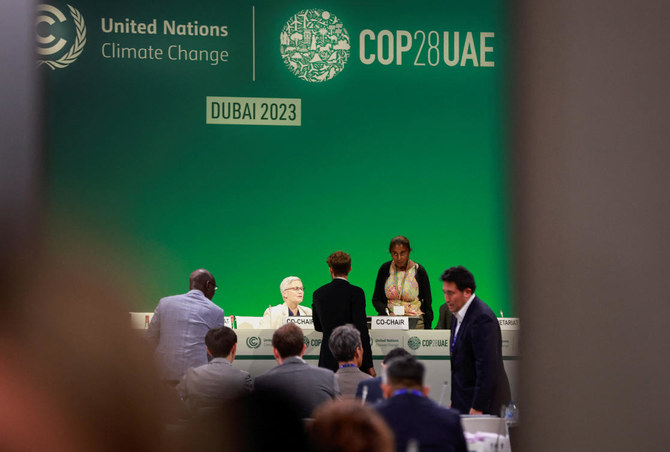DUBAI: United Nations climate negotiators directed the world on Wednesday to transition away from planet-warming fossil fuels in a move the talks chief called historic, despite critics’ worries about loopholes.
Within minutes of opening Wednesday’s session, COP28 President Sultan Al-Jaber gaveled approval of the central document — the global stocktake that says how off-track the world is on climate and how it will get back on track — without asking for comments. Delegates stood and hugged each other.
“It is a plan that is led by the science,’’ Al-Jaber said. “It is an enhanced, balanced, but make no mistake, a historic package to accelerate climate action. It is the UAE consensus.”
“We have language on fossil fuel in our final agreement for the first time ever,” said Al-Jaber, who’s also CEO of the UAE’s oil company.
United Nations Climate Secretary Simon Stiell told delegates their efforts were “needed to signal a hard stop to humanity’s core climate problem: fossil fuels and that planet-burning pollution. Whilst we didn’t turn the page on the fossil fuel era in Dubai, this outcome is the beginning of the end.”
ADOPTED: With an unprecedented reference to transitioning away from all fossil fuels, The UAE Consensus is delivering a paradigm shift that has the potential to redefine our economies.#COP28 #UniteActDeliver pic.twitter.com/XImRxXnl4C
— COP28 UAE (@COP28_UAE) December 13, 2023
Stiell cautioned people that what they adopted was a “climate action lifeline, not a finish line.”
The new deal had been floated early Wednesday and was stronger than a draft proposed days earlier, but had loopholes that upset critics. Analysts and delegates wondered if there was going to be a floor fight over details, but Al-Jaber acted quickly, not giving critics a chance to even clear their throats.
Several minutes later, Samoa’s lead delegate Anne Rasmussen, on behalf of small island nations, complained that they weren’t even in the room when Al-Jaber said the deal was done. She said that “the course correction that is needed has not been secured,” with the deal representing business-as-usual instead of exponential emissions-cutting efforts. She said the deal could “potentially take us backward rather than forward.”
When Rasmussen finished, delegates whooped, applauded and stood, as Al-Jaber frowned and then eventually joined the standing ovation that stretched longer than his plaudits. Marshall Islands delegates hugged and cried.
The European Union’s delegation, which stood with small island nations in fighting for stronger language to rid the world of fossil fuels, instead celebrated the agreement as historic.
“I am in awe of the spirit of cooperation that has brought everybody together,” United States Special Envoy John Kerry said. He said it shows that multilateralism can still work despite what the globe sees with wars in Ukraine and the Middle East. “This document sends very strong messages to the world.”
We delivered world first after world first.
A global goal to triple renewables and double energy efficiency.
Declarations on agriculture, food and health.
More oil and gas companies stepping up for the first time on methane and emissions.
And we have language on fossil fuels… pic.twitter.com/EWjWBVIpFi
— COP28 UAE (@COP28_UAE) December 13, 2023
The deal also includes a call for tripling the use of renewable energy and doubling energy efficiency. Earlier in the talks, the conference adopted a special fund for poor nations hurt by climate change and nations put nearly $800 million in the fund.
“Many, many people here would have liked clearer language” on getting rid of fossil fuels, Kerry said. But he said it’s a compromise.
United Nations Secretary-General Antonio Guterres said in a statement that “for the first time, the outcome recognizes the need to transition away from fossil fuels.”
“The era of fossil fuels must end – and it must end with justice and equity,” he said.
The deal doesn’t go so far as to seek a “phase-out” of fossil fuels, which more than 100 nations, like small island states and European nations, had pleaded for. Instead, it calls for “transitioning away from fossil fuels in energy systems, in a just, orderly and equitable manner, accelerating action in this critical decade.”
The deal says that the transition would be done in a way that gets the world to net zero greenhouse gas emissions in 2050 and follows the dictates of climate science. It projects a world peaking its ever-growing carbon pollution by the year 2025 to reach its agreed-upon threshold, but gives wiggle room to individual nations like China to peak later.
Intensive sessions with all sorts of delegates went well into the small hours of Wednesday morning after the conference presidency’s initial document angered many countries by avoiding decisive calls for action on curbing warming. Then, the United Arab Emirates-led presidency presented delegates from nearly 200 nations a new central document — called the global stocktake — just after sunrise.
It was the third version presented in about two weeks and the word “oil” does not appear anywhere in the 21-page document, but “fossil fuels” appears twice.
“This is the first time in 28 years that countries are forced to deal with fossil fuels,” Center for Biological Diversity energy justice director Jean Su said. “So that is a general win. But the actual details in this are severely flawed.”
“The problem with the text is that it still includes cavernous loopholes that allow the United States and other fossil fuel producing countries to keep going on their expansion of fossil fuels,” Su said. “There’s a pretty deadly, fatal flaw in the text, which allows for transitional fuels to continue” which is a code word for natural gas that also emits carbon pollution.

























